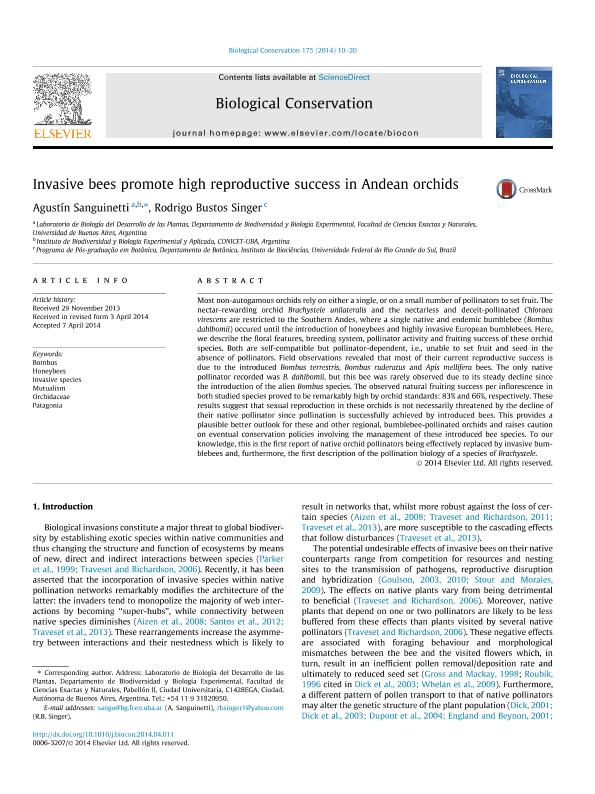Artículo
Invasive bees promote high reproductive success in Andean orchids
Fecha de publicación:
07/2014
Editorial:
Elsevier
Revista:
Biological Conservation
ISSN:
0006-3207
Idioma:
Inglés
Tipo de recurso:
Artículo publicado
Clasificación temática:
Resumen
Most non-autogamous orchids rely on either a single, or on a small number of pollinators to set fruit. The nectar-rewarding orchid Brachystele unilateralis and the nectarless and deceit-pollinated Chloraea virescens are restricted to the Southern Andes, where a single native and endemic bumblebee (Bombus dahlbomii) occured until the introduction of honeybees and highly invasive European bumblebees. Here, we describe the floral features, breeding system, pollinator activity and fruiting success of these orchid species. Both are self-compatible but pollinator-dependent, i.e., unable to set fruit and seed in the absence of pollinators. Field observations revealed that most of their current reproductive success is due to the introduced Bombus terrestris, Bombus ruderatus and Apis mellifera bees. The only native pollinator recorded was B. dahlbomii, but this bee was rarely observed due to its steady decline since the introduction of the alien Bombus species. The observed natural fruiting success per inflorescence in both studied species proved to be remarkably high by orchid standards: 83% and 66%, respectively. These results suggest that sexual reproduction in these orchids is not necessarily threatened by the decline of their native pollinator since pollination is successfully achieved by introduced bees. This provides a plausible better outlook for these and other regional, bumblebee-pollinated orchids and raises caution on eventual conservation policies involving the management of these introduced bee species. To our knowledge, this is the first report of native orchid pollinators being effectively replaced by invasive bumblebees and, furthermore, the first description of the pollination biology of a species of Brachystele.
Palabras clave:
Bombus
,
Honeybees
,
Invasive Species
,
Mutualism
,
Orchidaceae
,
Patagonia
Archivos asociados
Licencia
Identificadores
Colecciones
Articulos(IBBEA)
Articulos de INSTITUTO DE BIODIVERSIDAD Y BIOLOGIA EXPERIMENTAL Y APLICADA
Articulos de INSTITUTO DE BIODIVERSIDAD Y BIOLOGIA EXPERIMENTAL Y APLICADA
Citación
Sanguinetti, Agustin; Singer, Rodrigo Bustos; Invasive bees promote high reproductive success in Andean orchids; Elsevier; Biological Conservation; 175; 7-2014; 10-20
Compartir
Altmétricas




